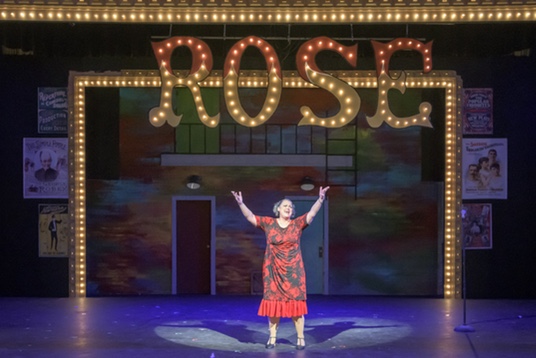Through Sun 8/12
Gypsy’s Mama Rose stamps motherhood as a fearsome creation. The Beck Center production, directed by Scott Spence, simultaneously exposes showbiz’s dark side and delights in its glories — namely story, music and dance. It’s an engaging and touching musical.
The show’s subtitle, “A Musical Fable,” speaks to the universal parent/child relationship. The story’s drawn by Arthur Laurents from memoirs of striptease artist Gypsy Rose Lee. The gorgeous score by Jule Styne and the witty lyrics by Stephen Sondheim lift what might have been a pitiful tale of woe about an overbearing stage mother and her two daughters to a musical theater classic. The multiple Tony Award-winning show seems to have been running one place or another since its 1959 Broadway opening.
The unflappable Natalie Blalock (as Mama Rose) took charge from the moment she barged down the Beck’s Mackey Theater aisle and onto the stage. Blalock’s rich voice, often as full as that of the legendary Ethel Merman (for whom the part was originally written), luxuriated in classics such as “Some People,” “Everything’s Coming Up Roses,” and “Rose’s Turn.”
We watch tryouts and performances as Mama Rose’s daughters, blonde Baby June (enchanting Calista Zajac) and touchingly clumsy brunette Baby Louise (a lively Grace Thompson) try to make it in 1920s vaudeville. Joined by a large and talented children’s ensemble, the two are shown traveling from city to city, offering comic variants of basically the same show, one that always features “Let Me Entertain You.”
Years pass. When the adult June (Gigi Hausman) decides she’s had enough, she runs off with dancer Tulsa (Enrique Miguel), but not before adult Louise (Emmy Brett) and Miguel knock our socks off with a great singing and dancing in “All I Need Is the Girl.”
Their departure leaves adult Louise to navigate a new career and to discover that she must find her own way (and make a lot of money and be a big success as a strip tease artist — with an emphasis on the “tease” since more skin is implied than seen). Strippers Mazeppa (Leslie Andrews), Tessie Tura (Leah Smith), and Electra (Tasha Brandt) show us with humor (and a trumpet) that to be a successful striptease artist “You Gotta Get a Gimmick.”
But the main story is Mama’s as she discovers that she’s not cut out for the domestic life she’d planned (after three previous marriages it’s a “duh” discovery) with her fiance Herbie (a likeable Allen O’Reilly). As Blalock celebrates in a dramatic closing song, it’s now “Rose’s Turn.” What Rose does after that is left unsaid. Curtain down. Bows. Show’s over.
Scenic designer Aaron Benson’s simple and effective touches gave us all we needed to imagine vaudeville in the 1920s. The stage, framed by lush red curtains with gold trim, and location-announcing placards set on either side, took us back to an age before projected titles. Lighting by Trad A. Burns focused our attention. Choreographer Martín Céspedes produced dance numbers both funny and (it seemed) flawless by a mix of children and adults tapping and swaying. The dancing cow should get special credit.
Conducted by Larry Goodpaster, the invisible orchestra (set behind a panel) sounded fuller than its numbers (16 by program listing). Sound designer Angie Hayes and Goodpaster were able to show off the score from overture to finale. (Since I often complain about the sound in the Beck, I’d like to note that this time it seemed excellent: bravo.)
BOTTOM LINE: Wonderful songs, witty lyrics, a stageful of talent — a great musical: What’s not to like? This is a show that doesn’t get stale — least not at the Beck.
